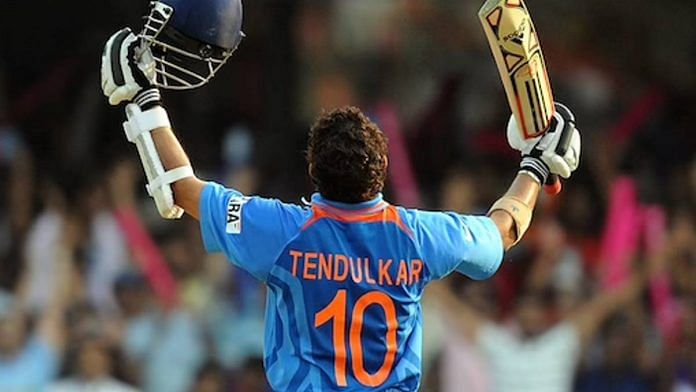New Delhi: The only time I doubted myself in my entire career was in the first Test match I played, against Pakistan’s (cricket players) Wasim (Akram), Waqar (Younis), Imran (Khan) and (Abdul) Qadir,” legendary Indian batsman and former cricket team captain Sachin Tendulkar, said in an interview published in the Hindustan Times .
“After I got out in the first innings, I came back to the dressing room and asked myself whether I was good enough to handle this level of cricket,” he said.
Tendulkar added: “I questioned myself because I didn’t realise that I was playing possibly the leading attack in the world at that time”, going on to explain that “if I had played against a side that didn’t have a great fast-bowling attack, I could have still handled it, but I was exposed to express pace and I had not experienced that. Nobody had… At age 16, it was an acid test”.
The cricket legend who turned 50 Monday, was referring to a 15 November, 1989, match when India and Pakistan played each other in Karachi. Tendulkar had made his debut at the match, when he was only 16 years old.
In the second Test, he said, he did not look at the scoreboard, but only took stock of time. This worked for him and helped him score 59 runs.
Despite his initial misgivings, Tendulkar went on to play for India for 24 years, captained the national cricket team between 1996 and 2000, and came to be regarded as one of the greatest batsmen of all time.
He also became the highest run-scorer in both One Day International (ODI) and Test cricket and earned the title of ‘Master Blaster’.
Winner of numerous national awards, the cricket icon was nominated to the Rajya Sabha after having retired from all forms of cricket in November 2013, after playing his 200th Test match.
When asked if it was difficult to say goodbye to cricket after representing his country for 24 years, Tendulkar said that “it wasn’t”.
Explaining his decision to retire, Tendulkar said that one day, during an ongoing Champions League (Twenty20 tournament), he missed a couple of training sessions.
“I didn’t practice, I didn’t go to the gym. And I had never done that in my life before,” he said.
“It made me wonder whether my body and mind were telling me that these things didn’t matter anymore. I was comfortable sitting in my room and watching TV,” he said, adding that this was when he discussed the thought of retirement with his brother and wife.
“It is all about the experience, and that last experience was wonderful for me. I would not change it for the world,” said Tendulkar, calling himself a “content athlete”.
Also read: Play Pakistan, know Pakistan—why Indian cricket can’t afford to let go of the golden window
On ‘dark phase’ & ‘new chapter’ of Indian cricket
In the interview, Tendulkar mentioned the shift in “chapter” for Indian cricket from the 1990s to post-2000.
He pointed out that around the year 2000, the Indian cricket team started getting players who were playing “at a different level” and termed them “match-winners”.
“In ODIs and even in Tests, they travelled better because there was more ammunition. We had the ammunition to counter-attack,” Tendulkar said.
He recalled that in the 1990s, the Indian cricket team was “more defensive”. “But in the 1990s, it was almost as if we were being asked to box with one hand tied behind our backs. We were just defending more than attacking. We felt that as a team. There were some decent names earlier also, but the consistency as a team was missing,” he added.
“There were some challenges as well… we all know that world cricket… Indian cricket… went through a dark phase. It was unexpected and that is why I say that post-2000 was a new chapter, with new faces in the team, new vision, new energy,” he said.
In the late 1990s, Indian cricket was struck by match-fixing allegations against big players such as Mohammad Azharuddin, Ajay Jadeja, Nayan Mongia, Ajay Sharma and Manoj Prabhakar.
(Edited by Nida Fatima Siddiqui)



